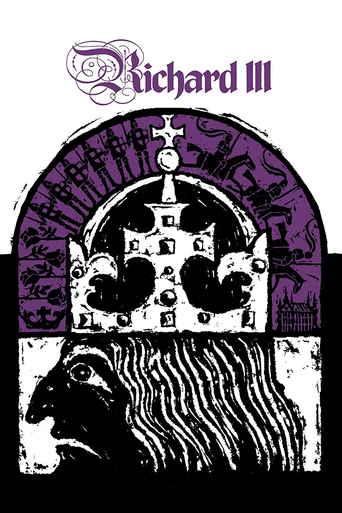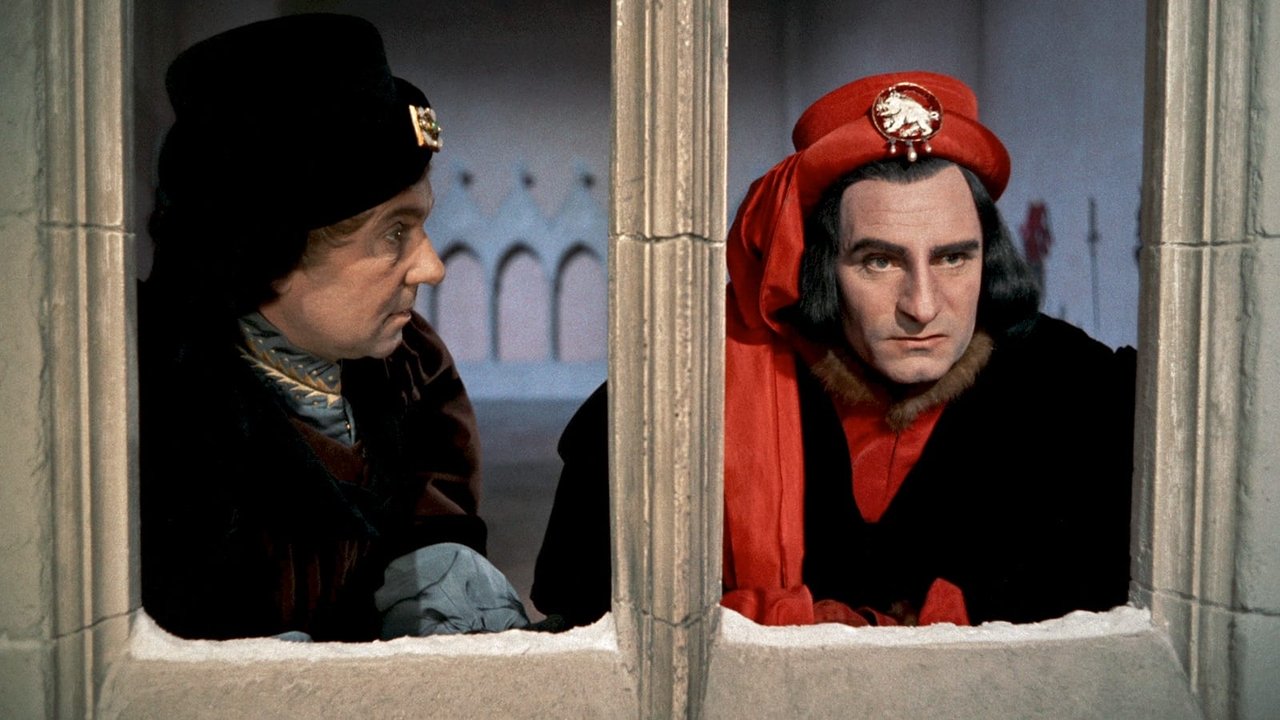kimhill-30062
So much has been written about this outstanding production there's not much more I want to add other than complete agreement I have put this playoff myself when I know the difficulty in the acting choices and how beautifully this film pulled it off with the amazing Central performance from the director and then ensemble but is flawless
haules_baules2001
This is the third movie in Olivier's trilogy of Shakespeare. I'd say this one is the worst of the three although the performance by Olivier here is the best. It's been called everything from brilliant to high camp but one thing it won't be called is forgettable. He steals every scene and is absolutely electrifying to watch. The opening soliloquy in particular is genuinely mesmerizing. Deceiving, cunning, often times funny, he lies, betrays and kills his way to the English Crown all the while letting us in on his plans. The score is solid while rest of the cast is passable. Ralph Richardson as Buckingham is probably the other performance worthy of note.That being said it does have its faults. As usual with Shakespeare it can be at times hard to follow. The script is full of metaphors and puns all being said at a vicious pace. Unless you know the play beforehand some of the content will be lost to you. Also, unlike Olivier's former efforts, the pacing seems slower here. At times the movie can get a little dull. The battle from the final act in particular is clumsy and messy.Overall, it's a flawed but still good movie. However as an introduction to Olivier's Shakespeare, Henry V is a better choice.
Neil Doyle
Just before he meets his gruesome death, RICHARD III utters those immortal Shakespearean lines--and, as delivered by LAURENCE OLIVIER, they are spoken in a highly melodramatic manner--as is most of the other prose whenever someone has a "big" scene to play.But Olivier gives most of the big moments to himself--and he does them with great finesse and dramatic flair. Still, I think his Richard could have been even more threatening than he managed to be (I'm thinking of Basil Rathbone in THE TOWER OF London). Likewise, RALPH RICHARDSON gives a sly look or two while they're plotting to eliminate candidates for the throne, but never seems to be evil enough to make his part seem believable. He almost seems like an innocent victim of Richard's machinations at times.CLAIRE BLOOM is lovely as Anne, but her sudden switch from mourning widow who spits at Richard to a woman who listens calmly to his loving talk and accepts an engagement ring is slightly ridiculous.The British cast is uniformly excellent, as always in these Shakespearean things, and JOHN GIELGUD is especially convincing as the ill-fate Clarence who gets drowned in a vat of wine.The killing of the two boys in the Tower could have been handled with more high drama than it is, but all the highly dramatic moments seem to go to Olivier only.Best acting job in the cast is done by ALEC CLUNES as Lord of Hastings, the only actor in the whole show who knows how to underplay effectively rather deliver bombastic shouts. CEDRIC HARDWICKE chews quite a bit of scenery in his death scene.William Alton's music is quite impressive, as is the color photography, vivid and affording many striking visuals of interiors and exteriors.The device of Richard speaking asides to the camera is a bit overused at times and is a bit distracting until the viewer gets used to it.Summing up: A good film, but not a great one--could have been so much better.
theowinthrop
It was Olivier's production of HENRY V that led to his showing what a creative producer/director of film he could be. His Oscar came from his "Freudian" interpretation of HAMLET. But I suspect that most people would say his greatest Shakespearean film (both as star and director) was this one - his performing the greatest villainous role in the English language, King RICHARD III.One can carp about the historical accuracy of RICHARD III from now until doomsday. That monarch was attacked by two of England's leading literary figures: Sir Thomas More (who is also a political/religious martyr), and Shakespeare. In comparison only two literary figures of any consequence ever defended him: Horace Walpole (the 18th Century diarist and letter writer - best recalled, if at all, for his Gothic novel THE CASTLE OF OTRANTO) and Josephine Tey, the dramatist and mystery novelist who wrote a detective story, THE DAUGHTER OF TIME, to defend him. More, a Tudor government official (eventually Lord Chancellor, before he fell from official favor) was close to one of Richard's foes, Cardinal Morton, and so accepted Morton's stories about Richard's murderous guilt. He wrote a HISTORY OF RICHARD III. Shakespeare, to keep official favor with the court, had to placate it with it's glorification of Henry VII, and vilification of the monarch who Henry defeated and killed. Walpole, a student of 18th Century skepticism and scholarship, wrote SOME QUESTIONS REGARDING RICHARD III, which point by point debated the so-called crimes Richard committed. Walpole, however, also was convinced that the pretender, Perkins Warbeck (executed 1499) was actually the younger one of the two Princes in the Tower. Tey used her gifts as a mystery novelist to examine the case as an intellectual puzzle for a recuperating Inspector Adam Grant in the novel. But she is basing her views on work done up to about 1935 or so, especially the Life of Richard III by the exploration historian Sir Clement Markhams. Today we realize more information from contemporary documents have come out. The balanced view is that Richard is truly a usurper (but this was par for the political course of 1483, especially after all of the blood and plotting of the War of the Roses). However, his actual planning of the deaths of Henry VI and his son, of George, Duke of Clarence, of Lords Rivers, Grey, and Hastings, and of his two nephews has never been conclusively shown (it could have been his one time ally the Duke of Buckingham, or his enemy Henry, Earl of Richmond/Henry VII, or even Cardinal Morton!). But without a dramatist or novelist of Shakespeare's stature, we are left with only Shakespeare's Richard - the finest example of a Machiavellian monarch on stage. So it is that the role can never be played poorly, unless by some stupid concept thrown in by a director (witness Richard Dreyfus's having to play Richard as an over-the-top homosexual in THE GOODBYE GIRLS due to Paul Benedict's idiot scheme of production). An example of the universality of the role was shown by Sir Ian McKellan's version a decade ago, set in the 1930s, suggesting Richard as a potential Fascist leader of Great Britain (complete with his "Hog" symbol used in place of a swastika). That film version too was wonderful.Olivier is ably assisted by his cast of Richardson, Guilgud, Baker, Hardwicke, Bloom, and the others who show what happens when a power-hungry monster is allowed to divide and conquer his opponents, and then seize total power. There are moments in the film where Olivier's real personality comes out in frightening intensity. One is where he is playing with the two nephews, and when one teasingly refers to his humpback, the camera and lighting shows an intense hatred and anger rising from his eyes (the boys, by the way, notice it and cower). The other is the point when Richard decides to rein in his erstwhile ally in his rise, Buckingham (Richardson) who is at court to present his request for some payment for his assistance. Richard shouts impatiently "I'm not in the giving mood today!", and crashes his scepter down narrowly missing Buckingham's hand. The Duke notices this, and soon is off on his ill-fated rebellion.RICHARD III was a first rate film - in my opinion it may be the best filmed version of a Shakespeare play made before 1980. It is regrettable that,whatever the reason, Olivier never directed another Shakespearean film (he planned at least one I would have been interested in - CORIOLANUS - which never got beyond the stage production). So enjoy the three we have, and his performances in the films OTHELLO and AS YOU LIKE IT, and the television versions of his THE MERCHANT OF VENICE and KING LEAR. It's all we'll ever have.


 AD
AD





